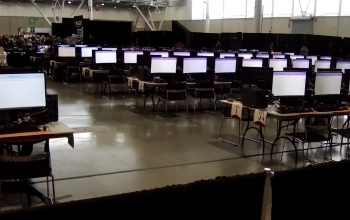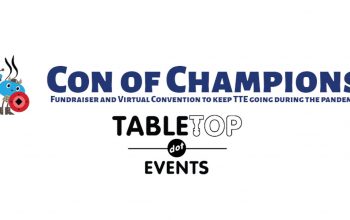On Saturday afternoon I ran my first game, a Warhammer FRPG game with all skaven characters. I ran a similar game last year, using the same characters in fact. Last year the skaven were tasked with reclaiming some escaped slaves, who had hidden themselves in various locations in a small human village. The skaven players had to skulk about at night and reclaim the lost slaves while avoiding too much notice from the town militia. This year, the entire game took place underground, as the skaven were asked to explore a newly opened tunnel into an old abandoned dwarven complex. It was known these dwarves before they died out had some very interesting technology, and the warlocks in Clan Skryre wanted to reclaim and repurpose as much of it as possible.
It turns out that these dwarves had actually devolved into a form of worship of Slaanesh, who rather than appealing to traditional lusts in this case was warping the dwarves’ addiction to advanced technology in unpleasant ways. The complex contained some of the golem like war-creatures the dwarves had built, still powered by the insane dwarf spirits sacrificed to the chaos gods during their construction. In the forge room was a massive pool of lava which once heated the forges, and now was home to a demon that took the form of a huge golden dwarf. The players managed to skip past the part of the tunnels occupied by living dwarves also attempting to reclaim and went straight the golems and demon. I think they did quite well all things considered, and quite a few laughs were had as the skaven tried to avoid the seriously dangerous parts and backstab each other as much as possible.
And I think ultimately that’s the key to any skaven based game. Give the players some pretense for being together, and then let them enjoy trying to subvert each other while still ostensibly contributing to the central goal. It’s difficult to come up with roleplay situations for the players to interact with an NPC, but the built-in tensions in skaven society makes for some very funny interactions with the other players.
I tried to use “old school techniques” in this game. I wrote the adventure in the one page dungeon format, though I had to go to two pages to fit all the Warhammer related stats and just due to the raw number of rooms. I also tried to keep things fast by not letting myself get bogged down with specific rules, especially for skills. I’d call something as requiring an ability test (default at half), and if someone had a skill that was appropriate it was up to them to tell me and I’d let them use that instead. It worked all right, but I also don’t think a lot of skills really got used, which may in itself be an indicator that it wasn’t working as well as I had hoped.
Warhammer FRPG combat continues to be much slower than I’d like. The critical system is very fiddly, counting half and whole actions is annoying, and I ended up looking up special weapon types (snaring, impact, etc.) more frequently than I’d like to. And don’t get me started about the dodge/parry stuff. I mean, the players need something to make it a little less deadly, but dodge and parry really does slow down combats. I frequently “forgot” to have the enemies play combat smart by using a parrying weapon or taking a parrying stance just to speed things up, though it did give the players a bit of an unfair advantage. I wasn’t too worried in this case as some of the enemies were beyond the ability of the players anyway.
It’s a shame, because I really do love the setting of Warhammer. I still think an enjoyable game could be made in that setting with simpler, lighter rules, but Jenn seems disinterested in such and if she’s not interested than I see no reason to not just play D&D.



Bah.
(I assume you’re referring to 2nd Edition WFRP)
The system runs a breeze with practice;
Skills are usually very self-evident and all run from your base stat line anyway, the character sheets even have a full list of the ones which may be attempted untrained.
Actions and half-actions don’t really have to be “counted”, you’re either making a pair of half actions or one full action every turn, and your players all have the list of these actions on their character sheet. For GMing I’d have a quick-reference for this, as its very simple.
The critical system can be sped-up immensely if you treat common enemies as always taking Instant Death criticals instead of using the charts every time (I believe the book suggests this).
You could always note weapon special rules on character sheets/NPC profiles until you can remember the common ones easily? Shouldn’t take much space for things like impact (damage roll 2d10, take the highest).
Parrying and Dodging are merely a single dice roll on WS, not all that time consuming- especially as theres a max of one parry and one dodge each per round (and you need the Dodge Blow skill to get the dodge at all) unless people are spending fortune points to take more.
All of your problems will vanish if you get a good amount of experience with the WFRP system, and it can run very very smoothly- until then I suggest you find/write a quick-reference for yourself (even a blank character sheet has a few good printed quick-notes for GMing) on some of these points, before you know it they will become second-nature.
Yes, I am talking about 2nd edition, and I know it quite well. I’ve played and run in campaigns of it for many years. I may have been a little rusty this past game simply because I’ve been running Basic D&D for the past year, but I’d say Warhammer is probably the system I know second best.
Skills annoy me not from the player’s perspective but from the GM’s. I am the one that must analyze a situation and decide which skill or skills apply to it. Which means I must know every skill in the game, and there are more than you think when you consider all the advanced skills that are not on the character sheet by default (just blank lines to fill in the ones you want). This is why I want to off-load that to the player. It’s much easier for me to decide which of a dozen or so stats applies to a given situation, and let the player scan his character sheet to figure out what if any skill should apply.
Actions must be “counted” by the players, in as much as they must count two halves or one whole when comparing options and figuring out what they want to do on their turn. I frequently must remind players “that’s a full action, you can’t do anything else” or “you still have a half action left, do you want to do anything else?” The strictness of the system inclines us to look at it as a resource that should be maximized. On the other hand, D&D has a more vague 10 second round. I feel quite at ease determining on the fly what does and does not fit in that, and nobody ever worries about not spending every second of that doing something useful.
I do agree with your assessment that common enemies should use instant death criticals. I might even take it so far as to say they get no criticals at all, once their wounds are at 0 they are dead. Only players and “important” NPCs would ever bother with the extra rolls. It does give the players a significant advantage in a fight though. Actually that’s probably a good thing, as I find Warhammer combat far more deadly than D&D. Which I suppose is why you need fate points, but that’s another conversation.
Noting the effects of special rules on the character sheet is a good idea. I’d have to do it for monsters too, which means yet more bulk on my trim two-page dungeon. It’s not terrible, but it does make me long for my two-line D&D stat blocks.
Parrying and Dodging are not difficult to deal with, but they extend combat time significantly. In my ideal game a single combat should take no more than 10 minutes to complete. Hits that are parried are just wasted rolls. I’d rather see something like having a parrying weapon or a dodge ability act as penalties to the initial to-hit roll. I hate all that back and forth with multiple rolls ending up in no effect. I think it’s a real downer for players too exulting in a good hit roll only to have it taken away when I tell them the monster parries or dodges. One single roll to determine if a hit lands or not is I think the ideal.
You’re right, the game would speed up if I got back into running the system regularly again. However, it would never be as fast as other lighter systems like D&D. Ultimately it comes down to simple preference. I prefer rules-light systems. Warhammer is not a rules-light system.
@Paul:
I’m with you on rules-light systems, at least when I’m GMing, and I’ll admit the majority of my experience with WFRP is as a player rather than a GM, and having a group of players who know the system as well as the GM does makes things a lot easier (this can be said for any RPG though).
Simplifying parries sounds like a good idea, but deriving a reasonable modifier from another person’s Weapon Skill score could be difficult- it has to make a difference, but at the same time not skew the chances so far as to make it impossible to hit someone with a high WS. I also think it could be a lot harder to remember who’s spent their parry/dodge each round, or flat out forget to apply the modifier, while the original system is easy to keep track of.
This is why I’m curious about adapting Warhammer Quest into a full on RPG. In that system, attack rolls are a single roll of a d6 with the result dictated by a chart which compares weapon skill. The exact same mechanic from the war game in fact. Special defense skills and armors all just add to toughness, which absorbs damage, but never grants a second roll to avoid a hit entirely.
Hmm, I suppose you could do that to parry/dodge as well, just make it that degrees of success absorb damage. Mechanically I’d prefer that, though the fiction is a bit harder to explain. I hit, I do 8 points of damage, you reduce it to 4 with your parry. What exactly happened? I guess you partially parried the blow, causing it to be glancing instead of hitting straight on?
I don’t see why you feel like you need to remind players about remaining half-actions. Yeah, if we try to do more than we’re supposed to, you need to remind us that it’s too much, but if I only use a half action and don’t realize I have another half-action to spend, it’s my own fault and my responsibility.
As to skills – again, no reason why you need to know all of them beyond knowing what they mean, and that’s pretty obvious from the name. I think players can handle figuring out if they have an applicable skill and asking if they can try to use it.
I think you think Warhammer is complicated and slow because you’re trying to do too much! ;P
As to the parrying/dodge “ruining” a good hit – well, what’s the problem? That’s part of the highs/lows of the combat. It all balances out in the end – your hit may be parried, but later on, maybe you’ll parry a big hit from the monster.
I guess that when we move, I’m going to have to find a WH group of my own, as you don’t seem inclined to ever run it again.
I’d say chances are very low of me starting up another WH game. I’d play in one, but I’m just not interested in running one. If you were willing to try my WHQ hybrid, I might try running that. Or maybe we should try to become better friends with Gary, I think he’s running a WH game.
I just don’t see the point of a WHQ hybrid, I guess.
Maybe I should bake Gary some cookies? Skaven cookies!
@Paul:
The wargame uses a perfectly good system (I play it regularly) but I’m not sure it could adapt to the scale of WFRP too well- I can’t comment on Warhammer quest, though Mordheim rules do come to mind for being closer.*
In reference to parrying, the main wargame does in fact include parry rules! Personally, I dislike it, but its a single rule: Replacing last edition’s hand weapon and shield combination granting infantry and additional +1 to their save in melee, it now grants a 6+ “parry” save which is taken after any failed normal armour saves (still adding that “extra roll” you’re attempting to avoid).
*I know mordheim has parrying rolls as well so it seems to be a common feature of warhammer games…
Yeah, I’m probably a few editions behind in my knowledge of the wargame. I know in general that the wargame includes armor saves, but in WHQ these are changed to simply be increases in toughness. This is because in WHQ there is no roll to wound, instead individual models generally take more wounds to kill and toughness is simply subtracted from the damage rolled (much like in the Warhammer RPG). It’s a nice hybrid approach between the wargame and the rpg: one roll to hit, any defensive measures simply absorb damage.
I’m sure there are some special items in WHQ that do allow a second roll to avoid a hit, but as these are usually special case magic items or similar, I’m inclined to be less grumpy about them as they likely have limits on number of uses.